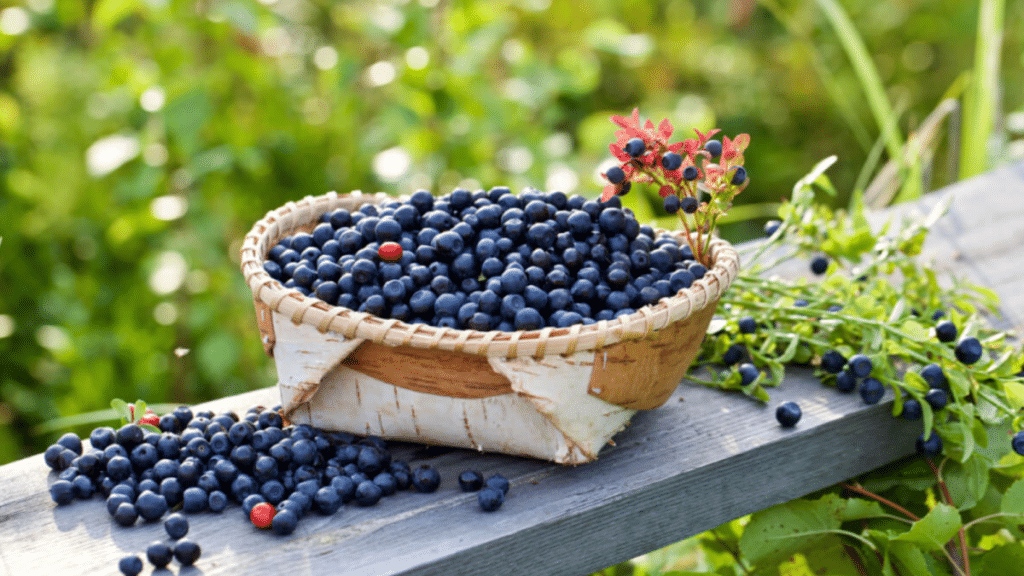You may have heard of bilberry because of its eye health support, but here’s some facts you may not have known. Bilberry is a fruit that can be found in the forests of Europe and North America. While the berries may be small, they pack a powerful antioxidant punch! If you’re interested in knowing how bilberry is grown, its active ingredients, health benefits, and what to look for when taking bilberry as a supplement, then you’ve come to the right place.
How Bilberry is Grown?
Bilberry is typically grown in Northern Europe, where the climate is cold and the soil is rocky. The berries are usually allowed to grow wild. During spring, after being dormant over winter, bilberry plants send up new shoots that grow into long branches covered with small leaves. These branches will bear fruit throughout summer until early autumn, when they are harvested by hand or mechanically. Bilberries have an extremely short growth period—just about three months.
But more importantly, you may be wondering how bilberries taste. You may be happy to know, that they taste a lot like blueberries, although a little more intense. If you are lucky enough to find fresh bilberries, you can use them as you would blueberries. However, to reap the health benefits of bilberries every day, it’s best to use them in supplement form.
Active Ingredients and Health Benefits in Bilberry
So, how do these berries support your health? Well, bilberry contains several active ingredients, including anthocyanins and proanthocyanidins. The anthocyanins give the berries their colour and give them their powerful antioxidants that help protect the body’s cells from free radicals, support healthy vision and eye health, and protect the eyes from macular degeneration. Proanthocyanidins are also abundant in bilberries. These are antioxidants that help support healthy blood flow and promote healthy brain function as we age by keeping our blood vessels flexible.
Let’s take a look at how these nutrients work to provide benefits throughout the body:
• Eye Health: Interestingly, bilberry was used as medicine during World War II by British pilots who claimed that eating bilberries improved their night vision and ability to adapt to glare. Scientific studies have backed up these testimonials by uncovering the antioxidant properties of bilberry. In one study, supplementation with bilberry and ginkgo biloba extract improved visual function in subjects with normal tension glaucoma. Some other studies found that bilberry supplementation helped to reduce dry eyes and eye fatigue at doses of 160 to 480 milligrams per day.
• Blood Sugar: The anthocyanins in bilberry may also support blood sugar balance, as they have been found to reduce post-meal blood glucose levels in people with diabetes.
• Heart Health: Bilberry has also shown to be beneficial for heart health. Studies have found that bilberry helps to reduce blood pressure, improve HDL (good) cholesterol, and reduce LDL (bad) cholesterol, all markers of heart health.
• Inflammatory Support: Other studies have shown that bilberry’s rich antioxidant content can help temper inflammation. In one placebo-controlled trial, bilberry and black currant supplementation of 300 milligrams per day reduced inflammatory markers more than the placebo.
• Healthy Aging: Because of its antioxidant properties, bilberry can also be used as a supplement to support healthy aging. Every day, we are exposed to chemicals and environmental pollutants that can cause aging. The antioxidants in bilberry can help to balance these free radicals.
How to Take Bilberry As a Supplement
You can find bilberry supplements in tincture and capsule form. Some bilberry formulas are made specifically for eye health and will combine bilberry with eyebright.
The recommended daily dosage is 160 to 240 milligrams of bilberry extract, standardized to anthocyanosides. However, studies have shown benefits at higher doses. It is best to speak with a qualified health practitioner before using a dose of bilberry that is higher than 240 milligrams per day.
What Bilberry Supplement is Best?
When shopping for bilberry, a standardized supplement is best to ensure you’re getting the appropriate dose per dose. Bilberry Standardized Extract by Natural Factors is a supplement that offers a standardized dose of 40mg of bilberry extract and 305mg of bilberry in a 5:1 powder per capsule and also contains 25% Anthocyanidins. Natural Factors is a trusted Canadian company that formulates clean and potent supplements that are favoured by many.
It is worth pointing out that bilberry is very safe to take as a supplement. However, Bilberry should be used with caution during pregnancy and nursing. Bilberry can have negative effects on iron absorption, so do not take it at the same time as your iron supplements. Bilberry may alter blood sugar levels, so use it cautiously if you are diabetic or hypoglycemic. Also, because bilberry has blood thinning properties, do not use it if you are taking blood thinners or discontinue using it 14 days prior to any surgery. Therefore, it is highly recommended that you take professional consultation from a qualified healthcare practitioner/naturopathic doctor before taking any supplements.
Bilberry is a very useful supplement for helping your eyes, heart, blood sugar, and more. If you are looking for a supplement that can support your body with low side effects, bilberry may be for you.
Disclaimer: The information in this article is intended for educational and informational purposes only and should not be considered as a substitute for medical advice. Please consult your practitioner prior to taking herbs or nutritional supplements.
